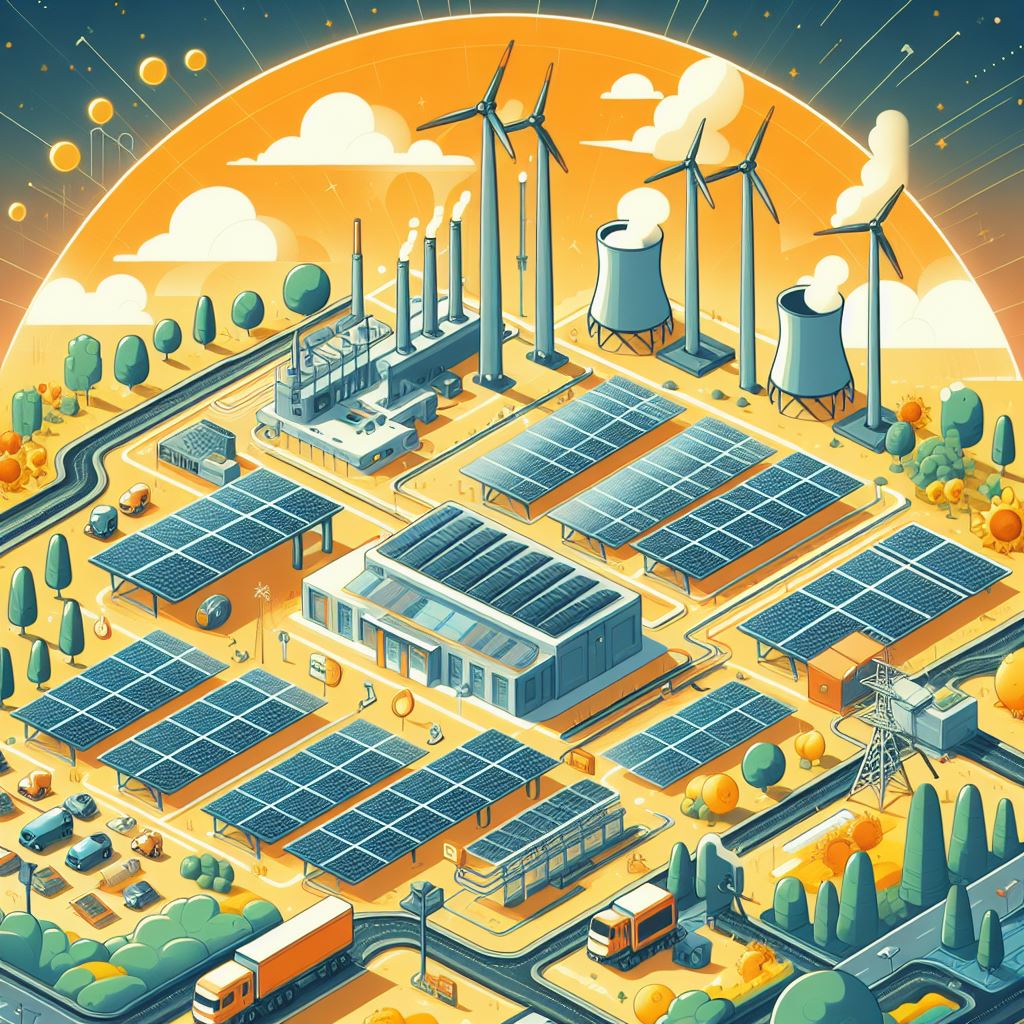Introduction
Biomass energy refers to energy produced by burning organic matter like wood, crop waste, and animal manure—the use of biomass energy dates to ancient times when people burned wood for warmth and cooking. Today, developed countries use biomass energy as a source of renewable energy. The importance of biomass energy cannot be overstated. As an abundant, renewable, and sustainable energy source, biomass energy can benefit modern society.

Types of Biomass Energy
Biomass energy is a renewable energy source that has the potential to replace fossil fuels. There are four main types of biomass energy: solid biomass, biogas, liquid biofuels, and biomass-based power plants.
Solid biomass is the most common type of energy produced by burning organic materials such as wood, agricultural waste, and forestry residue. This type of energy is typically used for heating and cooking in homes and industries.
Biogas is produced by organic materials decomposing without oxygen, such as waste from farms, households, and industries. It can be used in homes and industries for heating, cooking, and electricity generation.
Liquid biofuels are made from plant materials, such as sugarcane and corn, and are used as transportation fuels. They can be blended with gasoline or diesel or used as stand-alone fuels.
Biomass-based power plants use solid biomass or biogas as fuel to generate electricity. These power plants can provide electricity to homes, businesses, and industries.
Each type of biomass energy has advantages and disadvantages, but they all contribute to reducing our reliance on fossil fuels. Solid biomass and biogas are considered sustainable fuel sources, while liquid biofuels can directly replace gasoline and diesel. Biomass-based power plants can also contribute significantly to reducing greenhouse gas emissions.
Despite its advantages, the use of biomass energy faces some challenges. There is a lack of infrastructure and technology, high initial costs, and competition with fossil fuels. However, the emergence of advanced biofuels, which are produced from non-food feedstock, can provide a solution to these challenges.
In conclusion, biomass energy has come a long way since its inception, and as technology continues to evolve, its potential to replace traditional fossil fuels is enormous. The environmental and economic benefits of biomass energy make it a promising solution for a sustainable future.
Benefits of Biomass Energy
Introduction Biomass energy is derived from organic matter and has been used for centuries by humanity. The sources of this form of energy include plant materials, wood, and agricultural waste. Biomass energy helps create a sustainable future and moves us closer toward renewable resources.
Types of Biomass Energy There are different types of biomass energy, including solid biomass, biogas, liquid biofuels, and biomass-based power plants. Solid biomass mainly comes from wood and agricultural waste. Biogas is produced from the breakdown of biodegradable materials such as food and animal waste. Liquid biofuels include biodiesel and ethanol. Biomass-based power plants use organic materials to generate electricity.
Benefits of Biomass Energy Biomass energy has several advantages. Firstly, it is a renewable and sustainable energy source. As long as plant materials and waste exist, biomass energy can be produced. Unlike fossil fuels, biomass energy does not deplete our resources. Secondly, biomass energy reduces greenhouse gas emissions. It helps reduce carbon emissions that cause climate change. Thirdly, it provides economic opportunities. Using biomass energy can create job opportunities, particularly in agriculture and forestry. Lastly, it reduces our dependence on fossil fuels. The over-reliance on fossil fuels can have detrimental effects on the environment. Biomass energy is an excellent way to diversify our energy mix and secure resources.
Applications of Biomass Energy Biomass energy can be used for diverse applications. It can be used for heating and cooling, particularly in rural areas. Biomass-based power plants can generate electricity, and biogas can be used for cooking and lighting. Biomass-based transportation fuels can also be used to power vehicles.
Challenges and Opportunities in Biomass Energy While biomass energy has several benefits, there are also some challenges. These challenges include a lack of infrastructure and technology, high initial costs, and competition with fossil fuels. Emerging advanced biofuels also pose a challenge. However, there are opportunities as well. For instance, increasing government initiatives and policies can help promote biomass energy use.
Future Potential of Biomass Energy Biomass energy has enormous potential for the future. The global market for biomass energy is expected to grow significantly in the next few years. Advancements in technology will also make the production of biomass energy more efficient. As the demand for energy increases, biomass energy will become more relevant. Government initiatives and policies, such as subsidies and incentives, will also play a vital role in the growth of biomass energy.
In conclusion, biomass energy is a crucial part of our renewable energy mix. It has several benefits, including reducing greenhouse gas emissions, providing economic opportunities, and reducing our dependence on fossil fuels. While there are some challenges, the future potential of biomass energy is bright. It is essential to invest in this valuable resource and make it part of our energy solution.
Applications of Biomass Energy
Biomass energy has a wide range of applications across various sectors. One of biomass energy’s primary applications is heating and cooling systems. Biomass can be burned to generate steam or hot water, which can then be used to heat buildings or provide hot water for domestic use. Biomass energy is beneficial in colder regions where heating requirements are higher.
Another critical application of biomass energy is in electricity generation. Biomass can be burned to produce steam, which in turn generates electricity. This method of power generation is highly efficient and can provide a stable source of electricity to remote areas. Biomass-based electricity generation can also help reduce reliance on fossil fuels and reduce carbon emissions.
Transportation is another sector that can benefit from biomass energy. Biomass can be processed to produce biofuels such as biodiesel and ethanol. These biofuels can then be used in vehicles, reducing dependence on fossil fuels and carbon emissions.
Biomass energy also has applications in cooking and lighting. In many developing countries, biomass is a primary energy source for cooking and lighting. Whether burning wood for cooking or using biogas for lighting, biomass energy can provide a sustainable and affordable solution to meet basic energy needs.
Despite the many benefits of biomass energy, some challenges need to be addressed. One of the critical challenges is the lack of infrastructure and technology. The cost of establishing and maintaining biomass energy infrastructure can be high, and there is a need for more efficient and effective technologies to make biomass energy more viable.
Another challenge is the competition with fossil fuels. While biomass energy has the potential to provide a clean and renewable source of energy, fossil fuels remain the primary source of energy in many parts of the world. To overcome this, there is a need for greater awareness and education about the benefits of biomass energy and the risks associated with the continued use of fossil fuels.
In summary, biomass energy has the potential to revolutionize the way we generate and use energy. From heating and cooling to transportation and cooking, biomass energy can provide sustainable solutions for various applications. While there are challenges to overcome, biomass energy’s future potential is truly exciting, and we should all be looking at ways to embrace this technology and move toward a more sustainable future.
Challenges and Opportunities in Biomass Energy
Biomass energy has the potential to replace carbon-based fuel due to being a sustainable and renewable energy source. However, there are still some challenges and obstacles hindering its widespread adoption.
Lack of infrastructure and technology poses significant challenges for biomass energy development. Building fuel-processing plants, establishing transportation networks for biomass, and developing technology for increasing yields and efficiency remain substantial challenges. The lack of infrastructure also contributes to the high costs of biomass energy.
High initial costs are another significant challenge facing the industry. While the cost of producing biomass energy is decreasing, it requires substantial investment to construct plants, build transportation networks, and purchase equipment. These high costs can deter investors and prevent progress toward broader adoption.
One of biomass energy’s biggest challenges is its competition with traditional, carbon-based fuels. Fossil fuels are well-established and globally used, making it difficult for biomass energy to compete. Additionally, the low cost of fossil fuels has slowed the adoption of biomass energy.
The emergence of advanced biofuels poses both challenges and opportunities. Advanced biofuels are made from feedstocks such as algae, corn stover, and municipal waste, which could make biomass energy more attractive and efficient. However, the advanced biofuel industry is still in its early stages, and there is a need for significant technological advancement for it to be a viable option.
Despite the challenges, the future remains bright for biomass energy. The increasing energy demand, coupled with favorable government policies, may help to overcome these obstacles. Technological advancements, such as genetically engineered plants or bacterial processes, could make biomass energy more efficient and inexpensive.
In conclusion, while there are still obstacles facing the broader adoption of biomass energy, such as the lack of infrastructure and technology, high initial costs, competition with fossil fuels, and the emergence of advanced biofuels, the future still holds promise for this sustainable and renewable energy source.
Future Potential of Biomass Energy
Biomass energy may not be the most popular type of renewable energy, but its future potential should not be underestimated. The global market analysis for biomass energy suggests that this energy source could significantly contribute to worldwide energy production. Many countries across the globe are already adopting policies that promote biomass energy, which means that advancements in technology and the increasing energy demand will create new growth opportunities.
One of the key drivers of the growth of biomass energy is its ability to address climate change and reduce greenhouse gas emissions. This has led to an increased focus on renewable energy sources, and biomass energy is considered a reliable and sustainable option. Technological advancements have also made it possible to use biomass energy more efficiently and cost-effectively. This has resulted in the development of more efficient biomass systems and the emergence of new types of biofuels.
The increasing energy demand is also driving the growth of biomass energy. As the global population continues to grow, so does the need for energy to power homes and businesses. Governments across the globe are looking for ways to meet this demand sustainably, and biomass energy is seen as a reliable option. The fact that biomass energy can be produced locally and is not dependent on overseas sources of oil and gas is also a significant advantage.
Finally, government initiatives and policies are vital contributors to the growth of biomass energy. Many governments are introducing incentives and subsidies to promote the adoption of biomass energy. This has helped to create a favorable investment climate and has enabled the development of new biomass projects.
Against this backdrop, it is clear that the future of biomass energy looks bright. The global market analysis, technological advancements, increasing demand for energy, and government initiatives and policies all point to a bright future for biomass energy. As long as we continue to invest in this renewable energy source and support policies that promote its adoption, biomass energy could become one of the major contributors to worldwide energy production.
Conclusion
Biomass energy offers numerous benefits and applications in today’s energy industry. Its renewable and sustainable nature makes it a promising energy source for the future, despite challenges such as lack of infrastructure and high initial costs. As technology advances and the demand for energy increases, biomass energy will undoubtedly play a significant role in our transition toward cleaner and more sustainable energy sources.















